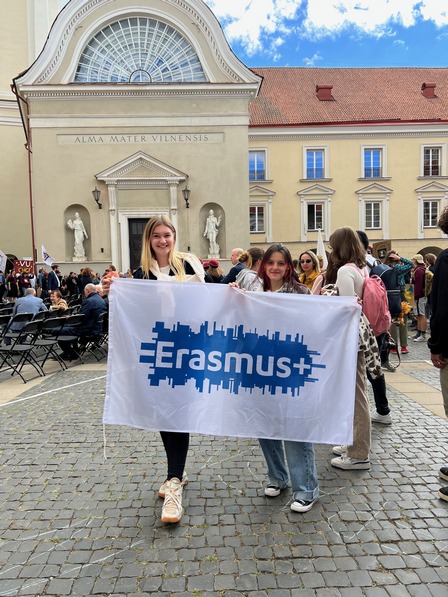

History of the University
Oles Honchar Dnipro National University: Prospects for development under wartime and postwar periodActive attempts to open a university in the city began only in the late 19th century. By that time, Katerynoslav had become one of the largest cities in the industrial South. It was obvious that the demographic and industrial potential of the provincial centre, which still remained a scientific province, required a significant number of qualified personnel. Thus, the idea of establishing a university in Katerynoslav was only in plans. The biggest lobbyists for the idea of establishing a university in Katerynoslav were representatives of the scientific community.
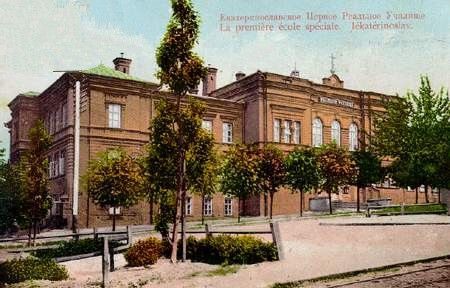
For a long time, however, the foundation of the university was hampered by historical events: the 1905-1907 revolution, the First World War of 1914-1918, and the outbreak of the 1917-1921 revolution.
Only in 1918, with the establishment of Hetman P. Skoropadskyi's rule, Ukraine gained some stability and, as a result, the opportunity to implement the project of creating a university in Katerynoslav.
The official approval of the main document of the university took place on the 20th of August in 1918. This date is considered the date of the university's foundation.
It happened thanks to the persistent efforts of the local intelligentsia and the support of prominent Ukrainian scientists Vernadsky, Bahalii, Vasylenko, and Pysarzhevsky, who petitioned for the opening of the university, which consisted of four faculties: History and Philology, Law, Medicine, and Physics and Mathematics.
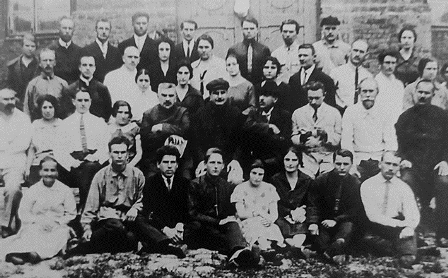

It is symbolic that our university was established in 1918 by the Ukrainian government of Hetman Pavlo Skoropadsky, because only after the founding of an independent Ukrainian state, the long-term efforts of local intellectuals to establish a classical university have a success.
2,750 students - this was the first contingent at 4 faculties in the academic year 1918-1919: 1 150 students at the Faculty of Medicine, 600 at the Faculty of Law, 500 each at the Faculties of Physics and Mathematics and the Faculty of History and Philology.

On the 14th of September, the first elected rector of the university was the famous histologist Volodymyr Karpov. The first years of the development of the university are associated with the names of such prominent scientists, professors and academicians such as Petro Leontovsky, Mykola Kabanov, Matvii Liubavsky, Lev Pysarzhevsky, Fedir Taranovsky, Leonid Reinhard, and Dmytro Yavornytsky. They were the ones who were the founders of scientific schools and university traditions.
Rapid industrialization shifted the Soviet government’s emphasis to technical universities, and the fight against academic freethinking led to the reorganization and creation of several specialized institutes on the basis of the classical university.


In 1933, Dnipro University was reestablished with five faculties, but repression and persecution of scholars affected its development. Rectors and heads of departments held positions for several months to a year. More than 100 professors, teachers and students of DNU became victims of the dictatorial regime. About 80 professors and lecturers of the university were sentenced to “the highest form of punishment” as enemies of the people. All of the repressed were rehabilitated in the 1950s, but the research they had been doing was curtailed.
At the same time, in the 1920s and 1930s a library, both a unified fundamental library and offices at the departments, the Institute of Hydrobiology, the Institute of Geology, the Institute of Physiology, and the Botanical Gardens were founded. In 1938, the Faculty of Philology, and in 1939, the Faculties of History, Physics, and Mechanics and Mathematics were founded.

Academicians Heorhii Kurdiumov, Vitalii Danylov, Oleksandr Dynnyk, professors Dmytro Svyrenko, Oleksandr Reinhard, Leonid Ivanov, and associate professor Oleksandr Belhard determined the development of academic science at our university for many decades ahead, our scientific mentors have continued their fundamental and applied research.
The difficult years of the Second World War suspended the university activities, and 160 employees and students went to defend their homeland, including professors Vasilevsky, Novoselov, Sukhonosenko, associate professors Alkhimov, Bystrytsky, Kartsev, Novytsky, Poyda, Sahaidachny, Yubkin, and Vasilev. Some of the scientists and equipment were evacuated, but professors and associate professors worked in schools, in field work, etc.
The difficult years of the Second World War suspended the university activities, and 160 employees and students went to defend their homeland, including professors Vasilevsky, Novoselov, Sukhonosenko, associate professors Alkhimov, Bystrytsky, Kartsev, Novytsky, Poyda, Sahaidachny, Yubkin, and Vasilev. Some of the scientists and equipment were evacuated, but professors and associate professors worked in schools, in field work, etc.


On the 25th of October, 1943, Dnipro was liberated from the Nazi occupiers, and Dnipro State University resumed its work. Vasyl Polezhaiev became the first rector after the war. The revival of the university began in extremely difficult conditions: about 70 percent of all DSU (Dnipropetrovs’k State University) buildings were destroyed. However, on the 6th of November, classes began at the university, and on the 1st of January, 1944, they became regular. In particular, the activities of 7 faculties were resumed: Physics and Mathematics, Biology, Chemistry, Geology and Geography, History, Philology, and the Faculty of Western Languages and Literature. 540 students started classes.


After going through the fronts of the Second World War, Pavlo Arhypovych Zahrebelnyi also entered our university.
In the 1950s, the university began to develop rapidly: the material and technical base was restored, new laboratories were opened, and scientific work intensified. In those years, great importance was paid to the strengthening of the links between science and industry and the implementation of research results. The faculties, departments and research institutes were connected and cooperated with large metallurgical plants not only in Dnipro, but throughout the country, with the railroad, geological trusts, fisheries, agriculture, etc.
A government decree on the deployment of a design bureau and factories in Dnipropetrovs’k to create rocket and space technology determined the vector of the development of our university and its special state support for many years. In 1951, the re-profiling of the Southern Machine-Building Plant was approved, and in 1952, the Faculty of Physics and Technology was founded. Mykola Ivanovych Varych became the first dean of the Faculty of Physics and Technology. The unique rocket and space technology created by the graduates of the Faculty of Physics and Technology is the result of the work of a powerful teaching staff of the Faculty of Physics and Technology, who combined theory with practice. These are Mykhailo Duplishchev, Mykola Heryasyuta, Volodymyr Kovtunenko, Veniamin Davidson, and Fyodor Sanin.
In close and fruitful cooperation with the Faculty of Physics and Technology, the Faculties of Physics and Mathematics and Chemistry worked on solving new problems.
In the 1950s, the university began to develop rapidly: the material and technical base was restored, new laboratories were opened, and scientific work intensified. In those years, great importance was paid to the strengthening of the links between science and industry and the implementation of research results. The faculties, departments and research institutes were connected and cooperated with large metallurgical plants not only in Dnipro, but throughout the country, with the railroad, geological trusts, fisheries, agriculture, etc.
A government decree on the deployment of a design bureau and factories in Dnipropetrovs’k to create rocket and space technology determined the vector of the development of our university and its special state support for many years. In 1951, the re-profiling of the Southern Machine-Building Plant was approved, and in 1952, the Faculty of Physics and Technology was founded. Mykola Ivanovych Varych became the first dean of the Faculty of Physics and Technology. The unique rocket and space technology created by the graduates of the Faculty of Physics and Technology is the result of the work of a powerful teaching staff of the Faculty of Physics and Technology, who combined theory with practice. These are Mykhailo Duplishchev, Mykola Heryasyuta, Volodymyr Kovtunenko, Veniamin Davidson, and Fyodor Sanin.
In close and fruitful cooperation with the Faculty of Physics and Technology, the Faculties of Physics and Mathematics and Chemistry worked on solving new problems.

In 1964, Volodymyr Mossakovsky, a doctor of physical and mathematical sciences and later academician, became the rector of DSU (Dnipropetrovs’k State University). He headed the university for 22 years. Under his leadership, in the 1960s, educational and laboratory buildings No. 5, 8 were built, and building No. 6 was put into operation. In the 1970s, the main educational and administrative building No. 1, buildings No. 8, 9, 10, 11, 12, a special department No. 13, a residential building, an exposition greenhouse of the Botanical Gardens, a Sports Complex, etc. were built.
In 1976, the Faculty of Economics was opened, and in 1977, the Faculty of Radiophysics. In 1984, the Faculty of Applied Mathematics was separated and the Faculty of Education was established. In 1985, DNU already had 11 faculties of full-time education.

From 1986 to 1998, the DNU was headed by Academician of the National Academy of Sciences of Ukraine, Doctor of Technical Sciences, a well-known scientist in the field of rocket and space engines and power plants, Honored Scientist Volodymyr Prysniakov.
After the declaration of the independence of Ukraine on August 24, 1991, social transformations affected the development of Dnipropetrovs’k State University. In 1987, Dnipropetrovs’k became an open city and the university began to develop partnerships with foreign universities, government organizations and industry. In 1989, DSU (Dnipropetrovs’k State University) hosted the first foreign delegation of students, and 15 years later, the number of foreign partners of DSU (Dnipropetrovs’k State University) would reach hundreds, and we would train specialists for 50 countries. Today, our partners include the best universities in Europe, America, Asia, research institutes and industrial giants.
The humanization of society, the change from a technocentric paradigm to a human-centered one, required specialists in the social sciences and humanities. DNU started training in sociology, political science, journalism, international economics, international information, etc. The number of academic specialties increased from 41 to 80; 17 newly created departments had a social and humanitarian profile; the state and university management pay special attention to the development of research in the Ukrainian language and literature, and the history of Ukraine. The Ukrainian language is being actively introduced into the educational process.


Since 1998, for almost 22 years, our university was headed by Mykola Viktorovych Polyakov, Corresponding Member of the National Academy of Sciences of Ukraine, Honorary Citizen of our city, Doctor of Physics and Mathematics, Honored Worker of Science and Technology of Ukraine, and holder of the Order of Merit (Ukraine).
Under the leadership of Mykola Viktorovych, international relations began to develop rapidly in the early 2000s, DNU became a regional leader in the implementation of TEMPUS projects, humanitarian areas continued to grow, and a network of language centers was established. The university has 15 faculties. The scientific library and the 1st building of DNU were also reconstructed.

In 2000, our university was granted national status by a decree of the President of Ukraine.
You can learn more about the history of Oles Honchar Dnipro National University at the University History Museum.
You can also read about the main stages of the development of DNU in the anniversary edition “History of Oles Honchar Dnipro National University”.
Personal memories of the university graduates and its staff can be found in the section “Impression through the Years”.
DNU photo chronicle “Once upon a time and now”.
Modern Life
Today, the university is a multidisciplinary educational and research complex with 14 faculties, 3 educational centres, postgraduate and doctoral studies, 3 research institutes, 77 departments, employing 879 teachers, including 35 academicians, 170 doctors of sciences, professors, and 540 candidates of sciences, associate professors.
The university also includes 4 specialty colleges (Mechanical Engineering, Rocket and Space Engineering, Industrial, Economics and Business), the Educational and Methodological Centre for Pre-University Training (including for foreigners), the Regional Centre for Continuing Education “Prydniprovia”, 2 lyceums, etc.
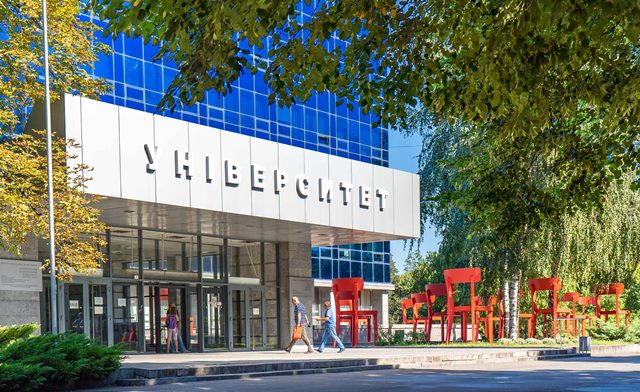
The university and its colleges enroll more than 10,000 students in 72 bachelor's degree programs (89 educational programs) and 56 master's degree programs (64 educational programs), as well as foreign students and postgraduate students (34 PhD programs) from more than 20 countries.
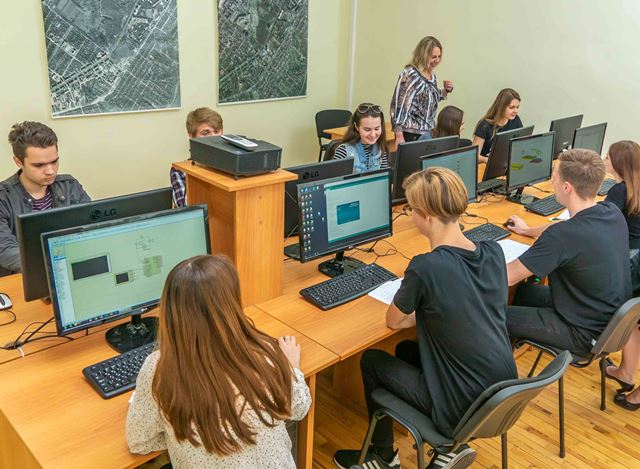
At DNU, you can get an education in modern fields: sociology, political science, clinical laboratory diagnostics, computer engineering, cybersecurity, avionics, food technology, journalism, public relations, Chinese and Japanese, design and others. The educational and research process at the university is provided at the level of the best national and international standards.


The University is proud of a whole galaxy of outstanding scientists – Academicians and Corresponding Members of the National Academies of Sciences of Ukraine and other countries, professors who have enriched the potential of national science with their original ideas and research, and have gained national and international recognition.
Since its inception, the university has trained more than 150,000 specialists, without whom it is difficult to imagine any sphere of public life. Graduates of Dnipro National University work in various sectors of the economy of Ukraine and abroad, head state institutions, educational and scientific structures, industrial associations, cultural centers, and the media.
Since its inception, the university has trained more than 150,000 specialists, without whom it is difficult to imagine any sphere of public life. Graduates of Dnipro National University work in various sectors of the economy of Ukraine and abroad, head state institutions, educational and scientific structures, industrial associations, cultural centers, and the media.
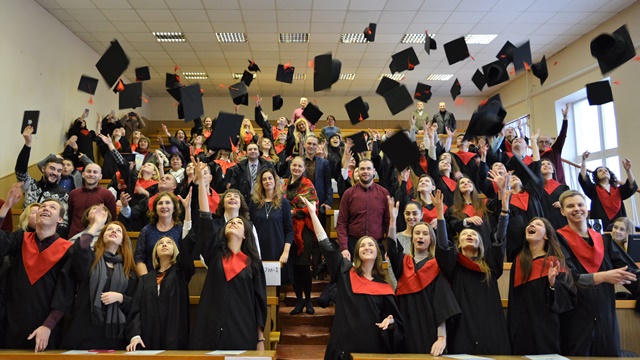
Today, the range of scientific research at Dnipro National University covers all the priority areas of science and technology development in Ukraine. Today, thanks to the efforts of leading scientists and the entire teaching staff, the university successfully develops well-known scientific schools in mathematics, mechanics, radiophysics and radio electronics, rocket and space technology, neurocybernetics, biotechnology, inorganic chemistry, historiography and source studies, history of Ukraine, archeology, Germanic studies, literature and linguistics, etc. The fundamental research of the classical DNU is multidisciplinary, which makes the university different from other universities in the region. The achievements of the university's scientists have been recognized by numerous state and industry awards, prizes, and grants from foreign scientific and educational institutions.
International Activities
Dnipro National University is a member of the Magna Charta Observatory.
Dnipro National University is a regional leader in the implementation of TEMPUS/TACIS projects under the auspices of the European Union. The total grant assistance to DNU since the beginning of its participation in this program (1994) has amounted to about $3.5 million.
Dnipro National University is a regional leader in the implementation of TEMPUS/TACIS projects under the auspices of the European Union. The total grant assistance to DNU since the beginning of its participation in this program (1994) has amounted to about $3.5 million.
Within the framework of the European Union's Erasmus+ program in the field of education, training, youth and sports, the following projects are being implemented at DNU under the Jean Monnet program: “The European Green Deal as a Prospect for Sustainable Economic Development” (Faculty of Economics) and “European Multiculturalism as an Experience and a Path to Ukraine's European Integration” (Faculty of History).
In 2022, the DNU project “Development of Theoretical Foundations for the Creation of Ultralight Launch Vehicles from Polymeric Materials” received financial support from the European Union's Horizon 2020 Framework Program for Research and Innovation. The project team includes scientists from the Faculties of Physics and Technology and Mechanics and Mathematics, the Research Institute of Energy Efficient Technologies and Materials Science of DNU and the Institute of Technical Mechanics of the National Academy of Sciences of Ukraine and the State Aviation Academy of Ukraine.
In addition, Dnipro National University is a member of international consortia. At the beginning of September 2022, DNU joined the Eastern Partnership Cluster, which was established at the initiative of Charles University (Prague, Czech Republic). The Eastern Partnership University Cluster (EULER) is a community of 12 universities from the EU and associated countries of the Eastern Partnership: Czech Republic, Germany, Hungary, Poland, Italy, Ukraine, Moldova, and Georgia. It is intended to support research projects, create joint courses or double degree programs, and develop cooperation in the field of academic mobility between EULER institutions.
In June 2023, DNU was included in the Foundation of European Universities, which aims to accelerate the modernization of the European educational area and promote social equality in higher education. In addition to DNU, the consortium includes 18 other European higher education institutions.
The university's international cooperation is also carried out within the framework of bilateral agreements with well-known universities and research centers in Europe, America and Asia. In total, 93 agreements on international cooperation of the university have been concluded and are in force.
Intensive exchange of students, researchers and teachers is carried out in the areas of activity of the university and its foreign partner institutions. Agreements related to academic mobility are being successfully implemented.
The university's international cooperation is also carried out within the framework of bilateral agreements with well-known universities and research centers in Europe, America and Asia. In total, 93 agreements on international cooperation of the university have been concluded and are in force.
Intensive exchange of students, researchers and teachers is carried out in the areas of activity of the university and its foreign partner institutions. Agreements related to academic mobility are being successfully implemented.
Within the Erasmus+ KA1 program, DNU actively implements academic mobility with 6 European universities. Students of all specialties of DNU also join international mobility programs such as Mitacs (Canada) and Global UGRAD (USA), and DNU teachers have repeatedly become scholarship holders of the American Fulbright and US Embassy programs.
Approximately 100 faculty members and staff of the research department annually go on business trips abroad. About 30 foreign lecturers and researchers annually participate in the university's educational process.
The University actively cooperates within the framework of agreements and double-degree programs with the University of Maine (France), the University of Applied Sciences in Mittweid (Germany) and the Higher School of Occupational Safety and Health Management in Katowice (Poland).
Every year, dozens of foreign delegations, mainly from partner universities, as well as representatives of government delegations and foreign embassies in Ukraine, visit Dnipro National University.
A scientific library of the University is one of the biggest among the libraries of Prydniprovia educational establishments. There are over 2 mln copies in its funds, 1 mln 400000 of which is scientific publications from different areas of knowledge, 460000 copies are educational methodological literature, 165000 – belles-lettres, 300000 – periodical publications, over 100000 – foreign publications.
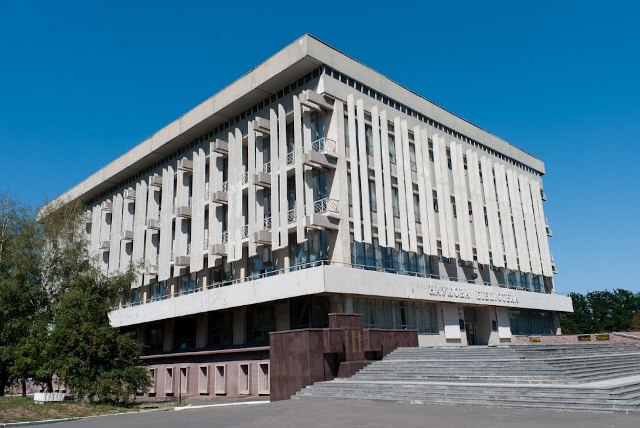
Dnipro National University has Prysamars’kyi international biosphere permanent establishment, botanical gardens, a complex of freshwater fauna “Akvarium”, a zoological museum.
The pearl of the University is a palace of students, which is appointed to be historical-architectonical monument of the national significance by the decree of the government. 8 collectives of amateur art activities work at the Palace of students of the university, 6 of them have honorary titles “National”.
The University has a modern sport base – a stadium, sport areas, a Palace of sport, where 7 sports halls are, a swimming-pool 25x50 m, a swimming-pool for children, a hall for fencing, there also work sections of 15 kinds of sports.

There is a trade union at the University. It promotes solving different questions of students’ life, organization of cultural-mass measures, social protection and students’ health improvement. Students are given the opportunity to receive the treatment in sanatorium-preventorium of DNU, to take part in a work of the University through the trade union organization.

DNU rector Okovytyy Sergiy Ivanovych, doctor of Chemistry, professor, Merited Scientist and Technologist of Ukraine, Distinguished Teaching Award Winner, born in 1970.After graduation from Chemical Faculty at Dnipropetrovsk State University in 1993 worked at the Department of Organic Chemistry as an assistant (1993 – 1996), senior teacher (1996 – 1997), associate professor (1997 – 2004), head of the department (2004 – 2017) and professor (2017 – currently).
Author (co-author) of 370 scientific and scientific-methodic papers, in particular 5 books and 102 papers including 56 papers published in international editions with high impact-factor and refereed by Scopus and Web of Science. H-index equals 12 and 13 accordingly.



